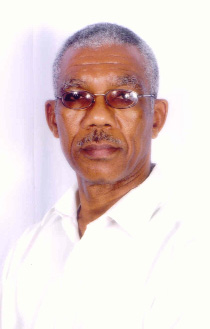On Friday, opposition leader, David Granger said there was none. “There is no ma or pa for independence here,” he said bluntly while giving the inaugural lecture of the National Assembly’s Governance and Democracy lecture series. “There is no father of the nation, there is no mother of the nation and I think we need to unlearn this myth.”
Granger will soon be contesting for leadership of the PNC, the party formed by the late president Forbes Burnham after his split with the PPP. Officials of the latter have argued that the late presidents Dr. Cheddi Jagan and Janet Jagan should be considered the mother and father of the nation. No PPP officials were present at the lecture.

A group, Granger said, was responsible for the birth of the nation. “Independence cannot be attributed to a single person or to a single party. If I had to attribute it to any group it would be to the workers because they were the first people to rock the British Empire and…today we need to give them credit for their contribution in bringing the West Indies and Guyana to independence,” he said. The working people of the Caribbean, the labour movement led by the “visionary” trade unionist Hubert Critchlow started the agitation for self-governance, he emphasized. “We must not only feel that we came from one source. There were many trees in the vineyard,” he said.
The opposition leader traced the “intense period” from 1946 to 1966 during which the various leaders of then British Guiana agitated for independence. It started with unity and headed downward quickly. The PPP split, the United Force was born, fractures and fights, riots and strikes, looting and shooting led up to the turbulent birth of the nation.
It has been argued that the split between Burnham and Cheddi was “racial”. But Granger pointed out that prominent Indo-Guianese like Joseph Lachmansingh and Jainarine Singh left with Burnham when he departed. Likewise, Afro-Guianese like Sydney King and Ashton Chase stuck with Cheddi. “So it doesn’t look like a racial split to me,” he said. Answers can still be gleaned from the two remaining survivors of the group of six, he added.
Granger was at times biting in his observations. He recalled that Guyana could have gained independence much earlier had the country joined the West Indies Federation as the British had decided to grant independence to these states. “But we had better things to do like fighting among ourselves,” he said. Those states that joined the Federation such as Jamaica and Trinidad gained their freedom from British rule earlier than Guyana. He also said that it was a great paradox that a statue of Critchlow stands on the lawns of the Public Buildings while the subvention for the college that bears his name was taken away by the PPP/C government.
The opposition leader also recalled the “tripartite forum” initiated by the colonial governor Sir Ralph Grey in an attempt to get the political parties, the PPP, PNC and UF to talk together. The result was gridlock. Then, later there was deadlock on the independence talks.
In 1965, the birth of Guyana neared and talks on the Constitution saw, among others, the introduction of the unicameral National Assembly, the Supreme Court and the Ombudsman. “That Ombudsman was part of our independence heritage and look at what happened to it,” Granger said. The government has not appointed an ombudsman for many years.




